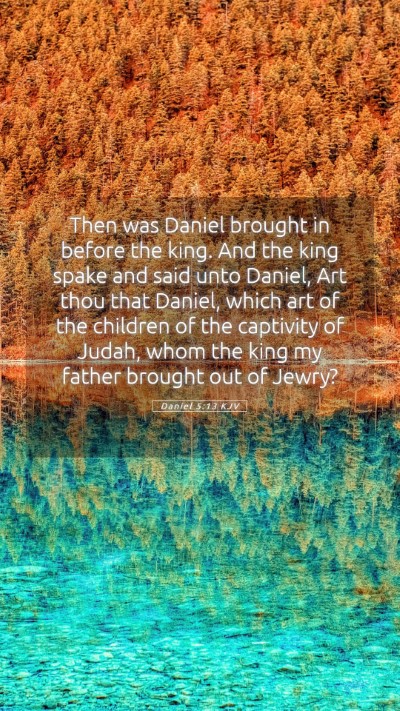Bible Verse Meaning of Daniel 5:13
Daniel 5:13 states: "Then Daniel was brought in before the king. The king spake and said unto Daniel, Art thou that Daniel, which art of the children of the captivity of Judah, whom the king my father brought out of Jewry?" This verse occurs in the context of Babylonian king Belshazzar's feast, where a mysterious hand writes on the wall, and it is Daniel who is called to interpret this divine message. Below is a comprehensive analysis of this verse, drawing insights from public domain commentaries such as those by Matthew Henry, Albert Barnes, and Adam Clarke.
Contextual Overview
This verse reflects a moment when the prominent figure of Daniel is reintroduced to the Babylonian court after a period of apparent obscurity. The historical backdrop is significant, as it places Daniel within the narrative of Israel's captivity, showcasing his resilience and the workings of God's providence in a foreign land.
Insights from Matthew Henry
Matthew Henry emphasizes the importance of God's chosen servants like Daniel in foreign courts. He remarks that Daniel's capabilities were recognized, even amidst the king's defiant indulgence during the feast. This commentary underscores how God raises up individuals at critical moments to convey His messages, demonstrating His sovereignty.
Albert Barnes' Commentary
Albert Barnes highlights that the king’s reference to Daniel as "that Daniel" suggests a mix of recognition and possibly a hint of disbelief. It implies that the king is aware of Daniel's past contributions but perhaps questions whether the same man would still possess the favor and insight from God that he once had. This highlights human skepticism in recognizing divine favor and wisdom in moments of crisis.
Adam Clarke's Interpretation
Adam Clarke brings out the notion of the “captivity of Judah” to emphasize Daniel’s status as an exile, which points to his faithfulness to God despite being in a foreign land. Clarke elaborates on the historical context and Daniel's previous role in Nebuchadnezzar's court, showcasing how the continuity of God's provision and wisdom is evident throughout different reigns. He argues that the reference to captivity also serves to illustrate that God can work through adverse circumstances to bring His servants into positions where they can glorify Him.
Key Themes and Applications
- Divine Providential Guidance: Daniel’s position in a foreign court illustrates that God can elevate His servants in unexpected circumstances.
- Recognition of God’s Chosen: The recognition of Daniel reflects the importance of acknowledging God’s work through His servants, even those who seem to be marginalized.
- Faithfulness Amidst Adversity: Daniel's enduring faith, despite his captivity, serves as an inspiration for believers facing their challenges.
- Humility in Leadership: The king's approach to Daniel reveals the need for humility and openness to wisdom, especially in leadership roles.
Cross References
- Daniel 1:6-7 - Daniel's background and his rise among the wise men of Babylon
- Daniel 2:46-49 - King Nebuchadnezzar's acknowledgment of Daniel's God and gifting
- Daniel 4:8-9 - Daniel’s interpretation of dreams in the court of Nebuchadnezzar
Conclusion
In summarizing Daniel 5:13, we find a profound illustration of God's faithfulness and the capacity of His servants to rise in moments of need. The verse stands as a reminder of the significance of understanding Scripture in its broader context and the intricate workings of God through history. It encourages believers to study the Bible deeply, apply its truths to their lives, and recognize the impact of faithfulness in challenging circumstances.
For those studying the Bible, Daniel 5:13 serves as a doorway into deeper theological reflection and understanding of God's sovereignty over the affairs of humanity, contributing to ongoing discussion in Bible study groups, online Bible study, and personal Bible study guides.


